We surveyed music fans across age groups and genre preference to ask their opinions on separating the art from the artist, the degree to which musicians should be held accountable for problematic behavior, and whether they could ever be forgiven.
The musicians responsible for the soundtrack to our lives often hold a very dear place in the hearts of fans, but lately it seems that support is rarely unconditional. Thanks to social media and its ability to quickly spread information, celebrity controversies no longer go unnoticed—even by their most loyal followers.
But disagreeing with an artist's actions does not always make their music less enjoyable. On the other hand, enjoying music while condemning the artist who performs it can be viewed as complicated at best (and hypocritical at worst). Is it possible to meaningfully denounce an artist's problematic behavior while continuing to listen to their music?
Before the internet, everyday people usually didn't know much about the personal lives and conduct of the artists they listened to. These days, most fans can connect with their favorite musicians through social media, and it's easy to feel as though the celebrities you follow are more like friends than strangers. So, what does it mean for fans when their top artist disappoints?
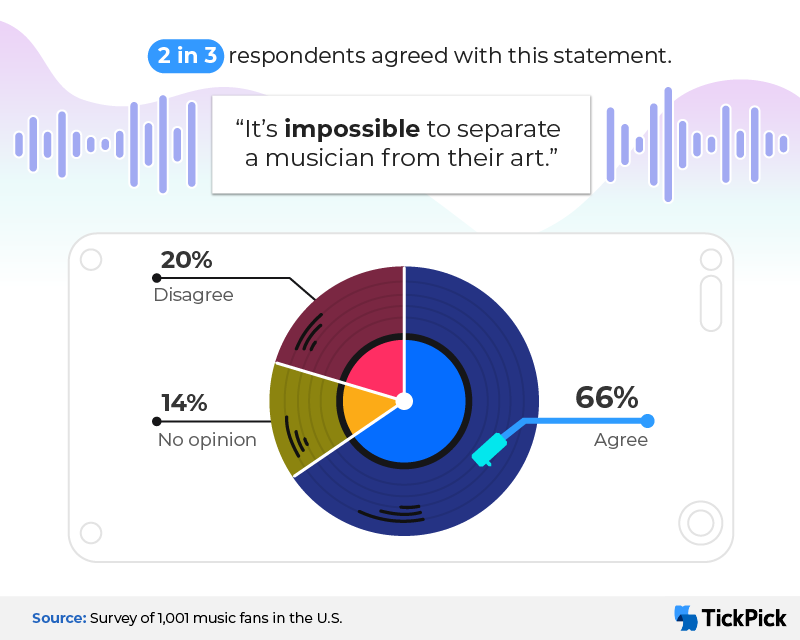
Of the 1,001 music fans surveyed, 88% agreed that supporting an artist involved everything from listening to their music to consuming related content and purchasing merchandise or concert tickets. Less than 2% of respondents directly disagreed with this statement. For almost 9 in 10 people, consuming the art of a problematic musician is equivalent to supporting them. Millennials and Gen X were slightly more insistent that it's possible to appreciate art independently of its artist, compared to their baby boomer counterparts.
It's interesting to note that the attitude toward separating a musician from their art varied across fans of different genres. For example, 74% of folk and gospel/Christian enthusiasts believed that it was impossible to separate their favorite performers from the music they release. On the other hand, grunge and indie rock fans were the least likely to agree with this statement; 58% and 52% of fans of these genres believed that a separation can't be made.
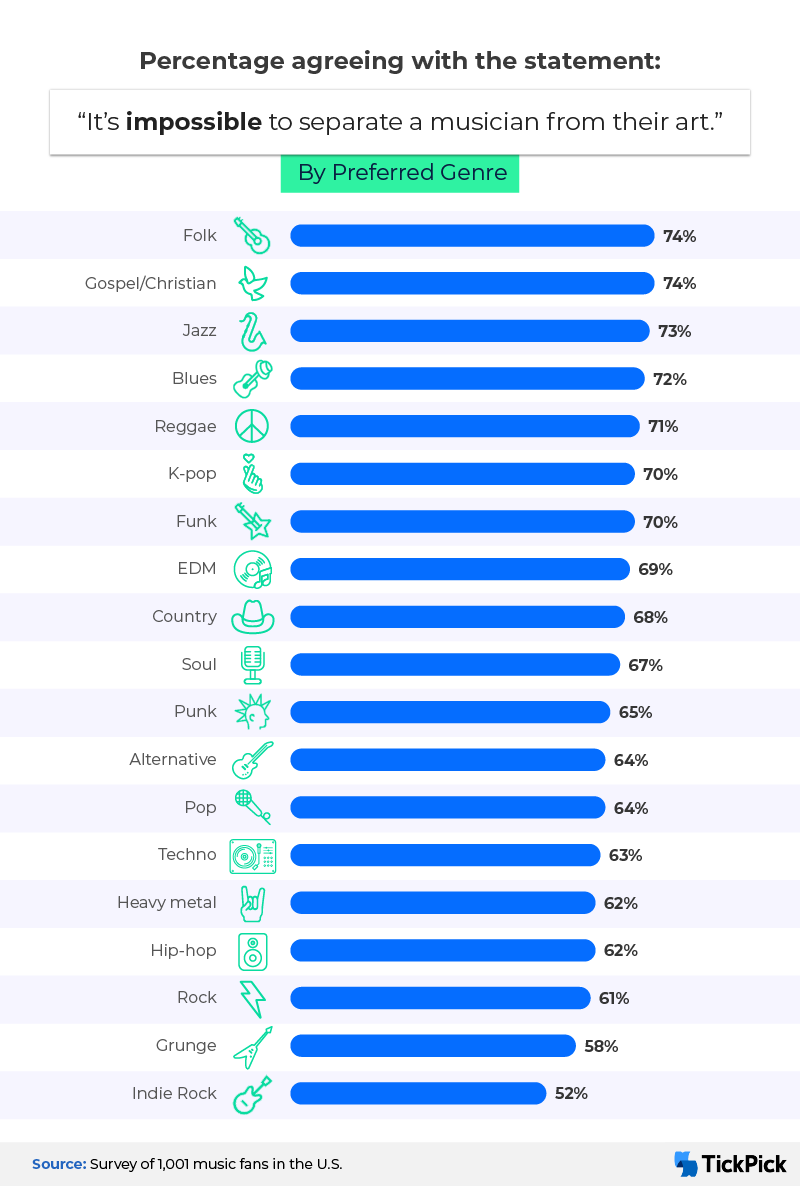
With most musicians earning a large portion of their revenue from touring, merch drops, and licensing, they rely heavily on their fans for success. A wave of disdain from a fan base can have lasting effects on an artist's career.
When asked whether fans should stop supporting artists who exhibit problematic behavior, 51% of survey takers believed that the answer was more nuanced than a simple yes or no—agreeing that it's situational.
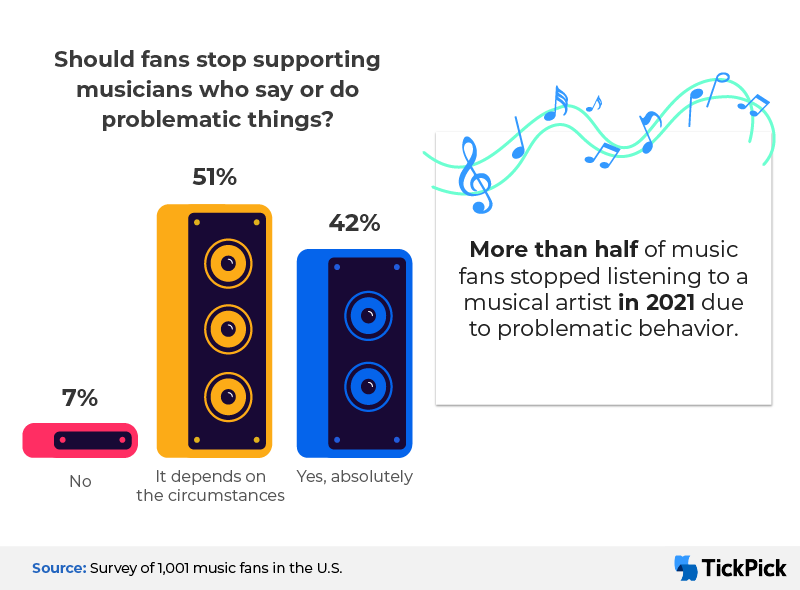
Men were more likely than women to take an absolutist stance on the matter, with around 47% believing fans should stop supporting controversial musicians absolutely, compared to the approximately 37% of women who echoed such sentiment. Millennials were more likely than Gen X or baby boomers to be absolutist as well, by similar margins. Men and millennials were also more likely than their counterparts to have stopped listening to an artist in 2021 due to their behavior. EDM, reggae, and funk supporters were the least forgiving, while indie rock, rock, and grunge fans were most likely to remain loyal to their favorite artists despite controversy.
When it comes to reacting to artist misconduct, there are a variety of things fans have done. The most common were the following:
Participants were also asked to share which artists they had personally stopped supporting this year due to recent controversy, and the top musician mentioned was R. Kelly.
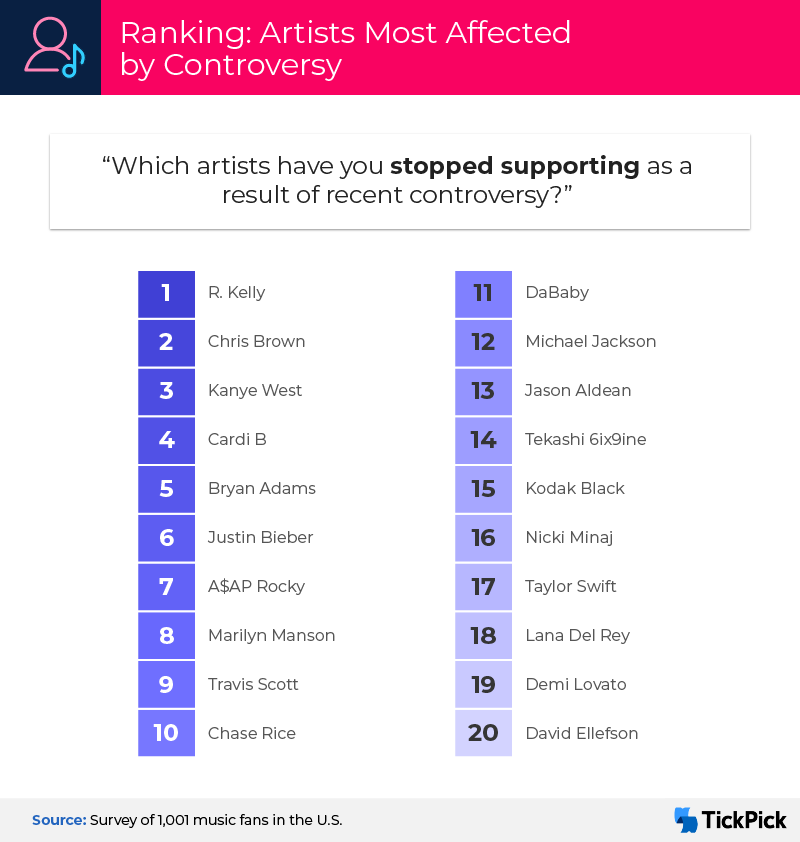
Other artists that made the list included Michael Jackson, Travis Scott, and Jason Aldean, with controversies ranging from alleged crimes to highly contested public opinions. In a relatively recent example, Travis Scott was accused of inciting violence at his Astroworld festival in Houston, which resulted in the death of 10 festivalgoers. Scott, who has faced charges for inciting riots at other concerts, received massive backlash online, with fans calling to have him removed from Coachella. Nike also announced that they would be delaying their collaboration with Scott after the tragedy. Despite the intense public outrage on social media, his album Astroworld rose in popularity on the Billboard 100 list days after the event.
The American country singer Jason Aldean had his own bout of controversy in recent months after his wife posted an Instagram photo of their toddlers wearing anti-Joe Biden T-shirts. He also applauded fans at his concert in New York for not wearing masks in August of this year, stating, "[he's] had just about enough of [masks]." Although his outspoken opinions have caused a stir online, he continues to release new music, and his song with Carrie Underwood was No. 3 on Billboard's Hot Country Songs during the first week of December 2021.
Given some fans' reactions to these cases, it's clear that many people strongly believe that there are good reasons to react to artists' controversial conduct. The number one reason fans believed artists should lose support after problematic behavior was to be held accountable for their actions. Over half of respondents thought that musicians should not profit from bad behavior, while 47% simply agreed discontinuing support was the right thing to do.
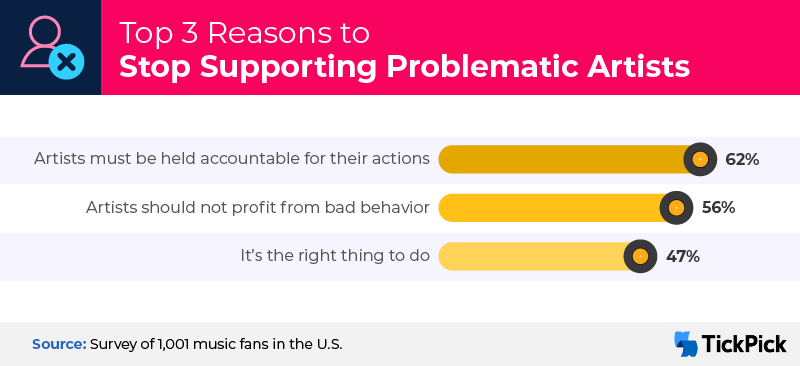
With the outsized social influence that many artists wield, it's no wonder that people will react strongly to their behavior. Fans largely agreed that artists should be held accountable for their actions. 60% of respondents agreed that due to an artist's influence, they should be held to a higher standard than the general public, while 52% lamented that too many musicians have avoided consequences in the past—and it's time they're held accountable.
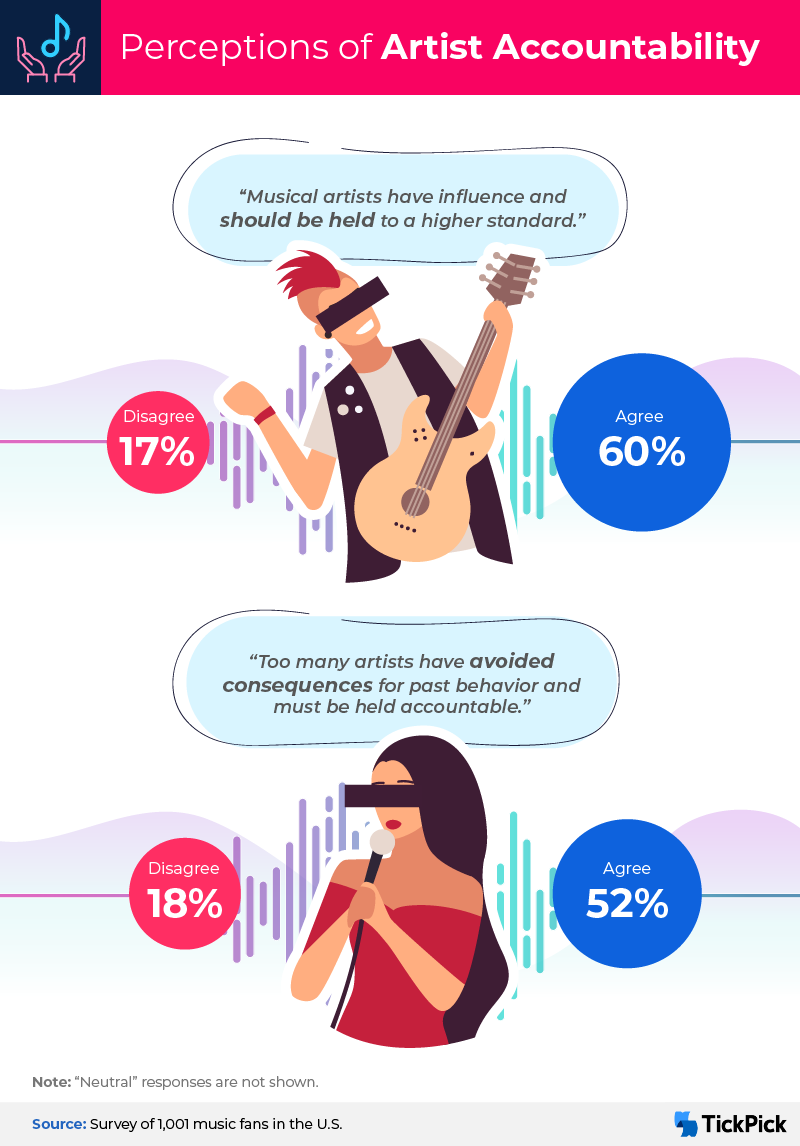
A Culture of Accountability
The discourse around cancel culture has been a hot topic for several years now. Some argue that the online masses have gone too far in attacking celebrities for past or current transgressions, while at the same time questioning whether cancellation has any lasting effects at all. Others maintain that what some call cancel culture is really just the long overdue accountability for the privileged following the #MeToo movement in 2017.
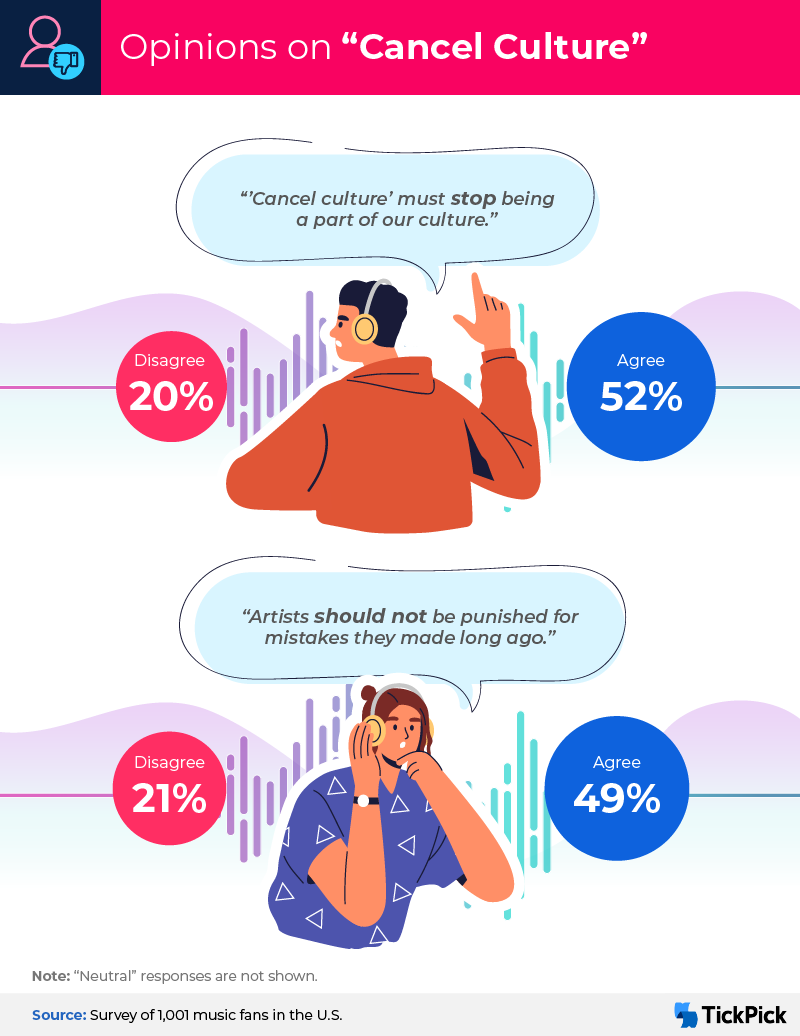
According to our survey, over half of music fans surveyed believed that cancel culture should be abolished altogether, while 47% of fans thought mistakes made by musicians a long time ago don't merit present-day punishments.
K-pop and EDM fans were harsher critics of the movement than indie rock listeners, who were the least likely to believe cancel culture should be stopped.
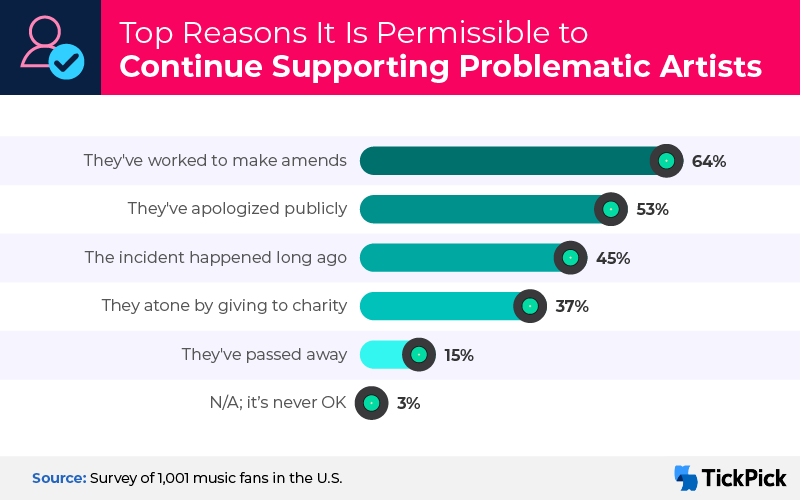
With the conversation around cancellation ever-present as celebrities continue appearing in headlines, respondents indicated what could compel them to forgive a controversial artist. 64% of music fans said that it could be OK to support an artist who's worked to make amends, making it the top reason to do so. A small percentage of people believed that once an artist passes away, it's permissible to support their music, and 3% indicated that they didn't think it was ever acceptable.
And for some artists, they will never regain any kind of public support again. R Kelly, who was found guilty on nine charges, including sex trafficking and sexual exploitation of a child, is unlikely to ever make a return to the mainstream. Spotify, although not removing him entirely from their platform, did roll out a feature allowing users to block him and other artists they no longer support, while YouTube permanently disabled Kelly's two official channels.
From the survey data, respondents seem to agree that the art of musicians can't be appreciated without also supporting the artists themselves. Music fans were quick to drop problematic artists, with more than half reporting having stopped listening to at least one musician in 2021 due to controversy. Although decisive in their stance, the majority of listeners were open to forgiveness as long as artists worked to make amends for their wrongdoings. What's certain is that music fans are not complacent and are loud in demanding that artists in the industry be held accountable for their actions.
The next time you're looking to support the artists you (still) love, check out TickPick.com to get your tickets to live music events without being charged extra service fees. TickPick makes purchasing concert, sports, and other entertainment tickets easy and hassle-free. We've saved our customers over $50 million in the last ten years and want to continue that by helping you save money when you book your next event through us.
Data used in this analysis came from a survey of 1,001 music fans ranging in age from 20 to 80 years old, with a mean age of 38. Relevant demographic sample sizes are as follows:
Generation
Gender
Sample sizes for fans of particular genres ranged from a low of 135 to a high of 530 with an average sample of 257. Respondents could select multiple genres.
To help ensure data quality and respondent attentiveness, all respondents were required to identify and correctly answer an attention-check question. Please note that survey data may be subject to certain limitations related to self-reporting. These limitations include telescoping, exaggeration, and selective memory.
Want to share what you see and continue the important conversation of accountability in the music industry? Feel free! Just be sure to do so for noncommercial use only and link back to our site to provide credit when doing so.